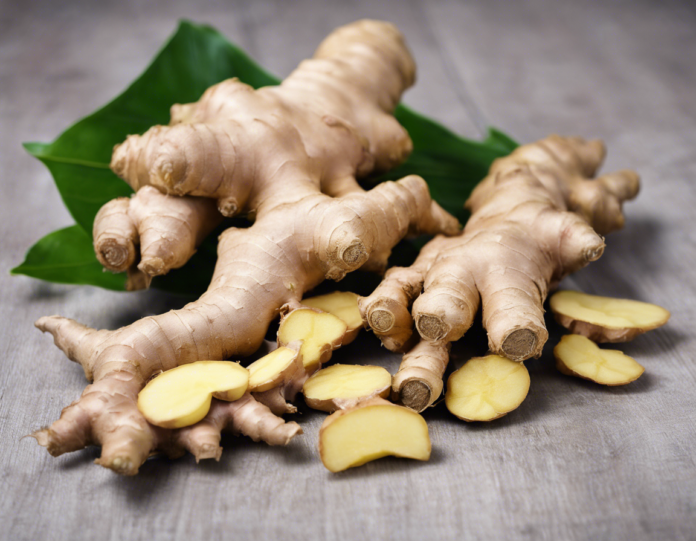Ginger is a popular spice that is widely used in cuisines around the world due to its unique flavor and numerous health benefits. However, there is often confusion about whether ginger is a stem or a root. In order to clarify this misconception, it is important to understand the botanical structure of the ginger plant.
Botanical Definition:
Ginger, scientifically known as Zingiber officinale, belongs to the Zingiberaceae family, which also includes turmeric and cardamom. The part of the ginger plant that is commonly used in cooking and for its medicinal properties is actually a rhizome, which is a type of underground stem. Botanically speaking, a rhizome is a modified subterranean plant stem that sends out roots and shoots from its nodes.
Rhizome vs. Root:
Unlike roots, which primarily serve to anchor the plant and absorb water and nutrients from the soil, rhizomes are storage organs that store starches and other nutrients to help the plant survive unfavorable conditions like drought. The rhizome of the ginger plant grows horizontally underground and gives rise to aerial shoots, known as pseudostems, that bear flowers and seeds.
Ginger’s Structure:
When you purchase ginger at the store, what you see and use in your cooking is the rhizome of the ginger plant. The rhizome of ginger is characterized by its knobby appearance, pale yellow flesh, and thin, light brown skin. It is this part of the plant that is harvested, processed, and used in various forms such as fresh, dried, powdered, or as an extract.
Culinary and Medicinal Uses:
Ginger has been used for centuries in traditional medicine systems like Ayurveda and Traditional Chinese Medicine for its digestive, anti-inflammatory, and antioxidant properties. In culinary applications, it is prized for its pungent, spicy flavor that adds warmth and depth to both savory and sweet dishes.
Health Benefits of Ginger:
– Digestive Aid: Ginger is commonly used to alleviate digestive issues such as indigestion, bloating, and nausea.
– Anti-Inflammatory: The active compounds in ginger, such as gingerol, have anti-inflammatory effects that may help reduce pain and inflammation.
– Immune Support: Ginger is rich in antioxidants that help boost the immune system and protect against oxidative stress.
– Nausea Relief: Ginger is a popular remedy for motion sickness, morning sickness during pregnancy, and chemotherapy-induced nausea.
How to Incorporate Ginger into Your Diet:
There are numerous ways to enjoy the flavor and health benefits of ginger:
– Fresh Ginger: Peel and mince fresh ginger to add to stir-fries, marinades, salad dressings, or steep it in hot water for a soothing ginger tea.
– Ground Ginger: Use ground ginger in baking recipes like gingerbread, cookies, or sprinkle it on oatmeal, yogurt, or smoothies.
– Ginger Supplements: Ginger supplements are available in various forms, including capsules, extracts, and tinctures, for those looking to incorporate ginger into their wellness routine.
Frequently Asked Questions (FAQs) About Ginger:
1. Is ginger safe for everyone to consume?
While ginger is considered safe for most people, individuals taking certain medications like blood thinners or suffering from gallstone issues should consult with their healthcare provider before consuming ginger supplements in large quantities.
2. Can ginger help with weight loss?
Some studies suggest that ginger may help with weight management by increasing metabolism and reducing hunger, but more research is needed to confirm its efficacy for weight loss.
3. Does ginger have any side effects?
When consumed in moderation, ginger is generally safe for most individuals. However, excessive intake of ginger may cause mild side effects such as heartburn, diarrhea, or mouth irritation.
4. Can ginger interact with medications?
Ginger may interact with medications like blood thinners, diabetes drugs, and blood pressure medications. It is advisable to consult a healthcare professional before consuming ginger supplements if you are on any medications.
5. How should ginger be stored for optimal freshness?
To keep ginger fresh, store it in the refrigerator in a paper towel to absorb excess moisture and prevent mold growth. Alternatively, you can freeze ginger for an extended shelf life.
In conclusion, ginger is a rhizome of the Zingiber officinale plant that is widely used for its culinary flavor and medicinal properties. Whether you enjoy it in cooking, teas, or supplements, ginger can be a flavorful and beneficial addition to your daily routine.

